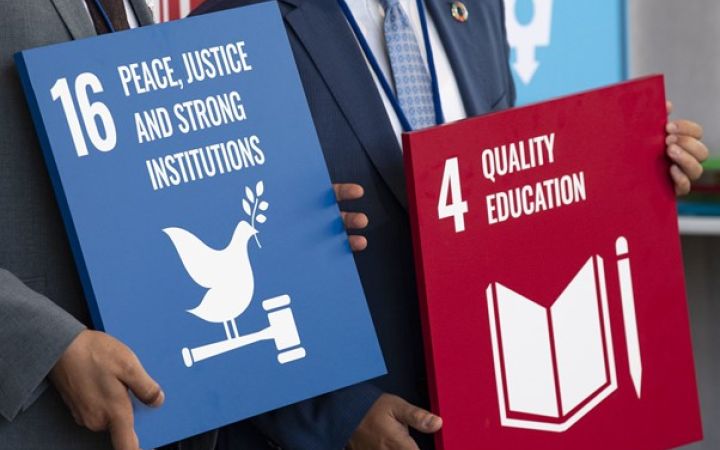UNITAR plays a crucial role in strengthening the capacities of United Nations member states and various stakeholders. By integrating Behavioural Science Insights (BI) into its Online Learning and Education Unit, UNITAR is innovating educational strategies that align with the goals of Agenda 2030, especially focusing on Sustainable Development Goals (SDGs) 4, 16, and 17, which centre on quality education, peace, justice, strong institutions, and global partnerships, respectively. By harnessing the power of behavioural science, UNITAR is driving transformative change in these areas and is committed to developing BI capacity to address complex challenges at the intersection of conflict, peace, development, and climate security.
Behavioural Insights to Achieve the Agenda 2030
Behavioural Insights combine principles from psychology, economics, social sciences and citizen sciences to better understand and influence human behaviour effectively. UNITAR collaborates with universities to leverage these insights to achieve the Agenda 2030’s objectives, employing tailored strategies for specific SDGs.
For SDG 4, which focuses on quality education, UNITAR incorporates several BI strategies into its course design. One such approach is the application of the "peak-end rule", a principle that enhances learner satisfaction and information retention by ensuring positive experiences at critical moments during the learning process. Additionally, motivational techniques such as social proof and peer comparisons are used to increase learner engagement and completion rates. The courses also integrate personalized learning technologies, which adapt educational experiences to meet individual learner needs, making the education process more efficient and learner-centric.
In support of SDG 16, which focuses on peace, justice, and strong institutions, BI principles are embedded in the creation of training modules that frame peaceful conflict resolution effectively. UNITAR employs nudge techniques to encourage active participation in democratic processes and initiatives that counter corruption. Effective communication, informed by behavioural insights, also plays a key role in strengthening peacebuilding efforts.
For SDG 17, which emphasizes partnerships for global goals, UNITAR’s programmes are enhanced through collaboration with university partners who bring diverse expertise. The application of BI principles helps optimize collaboration across sectors, fostering knowledge sharing and improved resource mobilization for sustainable development projects. By utilizing behavioural economics, UNITAR aims to strengthen partnerships and resource mobilization for sustainable development projects.
Developing Behavioural Insights Capacity for Complex Issues
UNITAR and its academic partners are working together to build BI capacity to address multifaceted challenges related to conflict, peace, development, and climate security. This effort involves forming interdisciplinary teams that bring together experts from behavioural and citizen sciences, conflict studies, development economics, and climate science. Action research projects are also underway, applying BI to real-world peacebuilding and development issues. Moreover, UNITAR is creating scenario-based training modules that use BI to improve decision-making in crisis situations. A systems-thinking approach is adopted to recognize the interconnections between conflict, development, and climate challenges, thereby enhancing the capacity of stakeholders to address these issues more effectively.
In the area of climate security, UNITAR uses behavioural science to develop communication strategies that convey the urgency of climate action in conflict-sensitive regions. BI-informed interventions also promote sustainable resource management in post-conflict environments. Additionally, training programmes help communities develop their capacity to manage risks related to both conflict and climate change, supporting long-term adaptation and resilience.
Collaborative Partnerships and Social Constructivist Pedagogy
UNITAR’s partnerships with universities also enrich its pedagogical approach to peace and conflict studies by integrating BI into a social constructivist framework. This educational model emphasizes the collaborative nature of knowledge construction, learning, and citizen science.
The infusion of BI into this model promotes more inclusive dialogue through the design of online forums that use behavioural nudges to foster constructive discussions. Systems of peer assessment leverage social norms to encourage thoughtful feedback and collaborative learning. Gamification, informed by BI principles, enhances engagement and encourages diverse perspectives in the analysis of conflicts. Additionally, realistic learning experiences, such as case studies and simulations, allow learners to apply BI principles in meaningful and impactful ways.
These academic partnerships also support cross-cultural learning, using BI to bridge cultural differences and foster mutual understanding. The co-creation of content between UNITAR and its partners ensures that diverse perspectives and contextual knowledge are integrated into the learning materials. Eventually, mentoring programmes informed by BI provide support to learners, helping them apply their knowledge to real-world peacebuilding scenarios.
Conclusion
Through its innovative integration of Behavioural Science Insights, UNITAR's Online Learning and Education Unit (OLE) is leading efforts to advance the Agenda 2030 in the realms of quality higher education, peace, and global partnerships. By building BI's capacity to confront complex issues in conflict-affected and climate-vulnerable settings, these collaborations enhance the effectiveness of peacebuilding and development strategies. Moreover, the incorporation of BI into social constructivist pedagogy is fostering more engaging and transformative learning experiences. As these partnerships evolve, they promise to equip emerging practitioners with the insights and skills necessary to navigate the intricate challenges of sustainable development and peacebuilding in our interconnected and ever-increasingly complex world.


